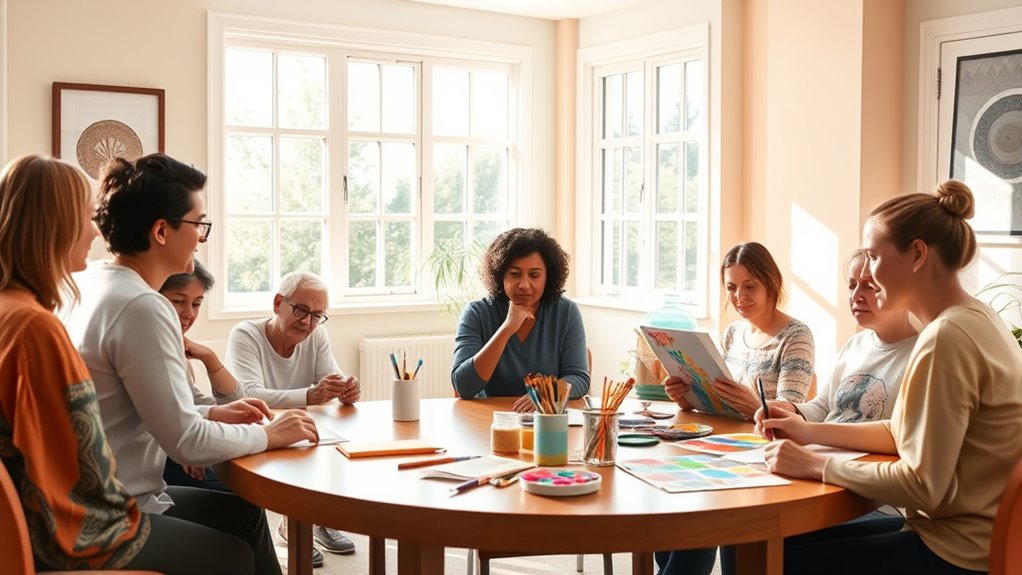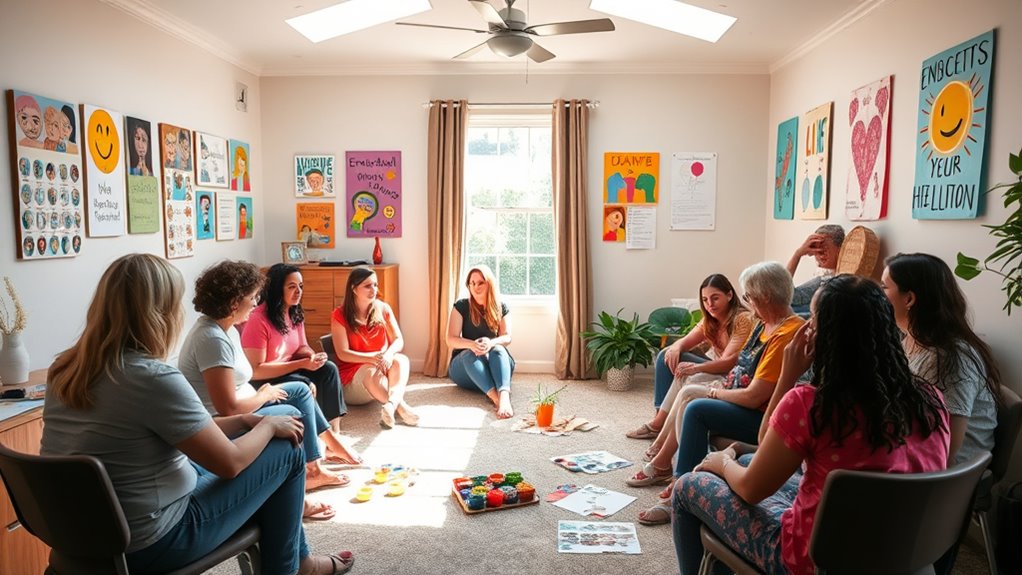Day programs for BPD offer structured outpatient care that combines therapy, skills training, and support to help you manage symptoms while staying connected to daily responsibilities. You’ll participate in individual and group therapy sessions focused on emotion regulation, interpersonal skills, and coping strategies. These programs promote confidence, resilience, and healthier relationships. If you want to learn about how these programs work and find the right fit for your needs, keep exploring the options available.
Key Takeaways
- Day programs offer structured outpatient therapy, including individual, group, and skills training for managing BPD symptoms.
- They focus on evidence-based treatments like Dialectical Behavior Therapy (DBT) to improve emotion regulation.
- Participants maintain daily responsibilities, returning home each evening to foster independence and real-world skills.
- Programs include psychoeducation, creative therapies, family involvement, and ongoing assessments to tailor treatment.
- Eligibility typically requires a BPD diagnosis, with assessments, family support, and coordination with healthcare providers.
Understanding Day Programs for BPD Treatment

Understanding day programs for BPD treatment means recognizing that they offer structured outpatient care designed to help you manage symptoms while maintaining your daily life. These programs typically involve several hours of outpatient therapy each day, allowing you to continue your responsibilities outside of treatment.
Day programs combine individual therapy, group sessions, skills training like Dialectical Behavior Therapy (DBT), and psychoeducation to develop effective coping strategies. They focus on improving emotion regulation, helping you better manage intense feelings and impulsive behaviors.
Unlike inpatient care, you return home each evening, fostering independence and applying skills in real-world situations. These programs are ideal for those with moderate symptoms who need intensive support but don’t require 24-hour supervision, offering a supportive, structured environment during the day. Resources and tools can also enhance the effectiveness of treatment by providing additional support and guidance outside of sessions.
Benefits of Participating in a Day Program

Participating in a day program offers you a structured support system that guides you through managing BPD symptoms. You’ll develop enhanced coping skills by practicing evidence-based treatments like DBT in real-life settings. This consistent routine helps you build confidence, reduce crises, and improve your overall well-being. Incorporating behavioral therapy techniques and understanding their role in emotional regulation can further support your progress.
Structured Support System
A structured support system in a day program offers consistent routines that help you develop essential skills and achieve greater stability. This structured routine ensures you engage in regular therapy, support groups, and psychoeducation, fostering continuous progress. Additionally, incorporating emotional support strategies within the program can significantly enhance your coping capacity and emotional resilience. This environment encourages practicing emotional regulation skills in real-time, giving you the chance to apply coping strategies in a safe setting. With professional oversight and accountability measures, you’ll be more likely to stick to your treatment plan and reduce the risk of relapse. Understanding the divorce process can also help you feel more in control of your situation during challenging times. Being informed about divorce laws in your area can facilitate more effective decision-making and reduce uncertainty. Recognizing fetal development stages can empower you to better understand your pregnancy progress and stay engaged with your prenatal care, which is an important part of prenatal health awareness.
Enhanced Coping Skills
Engaging in a day program for BPD helps you develop and practice essential coping skills like emotion regulation, mindfulness, and interpersonal effectiveness in a supportive environment. Through daily skill-building activities, you learn strategies to manage intense emotions and reduce impulsive reactions, leading to more stable moods. These programs emphasize emotion regulation techniques that help you stay grounded during challenging moments. As you build these coping skills, you also gain greater self-awareness and resilience, enabling you to handle triggers more effectively and prevent self-harm behaviors. Incorporating evidence-based approaches further enhances your ability to develop lasting coping mechanisms. Regular therapy sessions and peer support foster healthier relationships and communication. The structured environment promotes emotional regulation and reduces feelings of emptiness, which are common in BPD. Developing coping strategies in such settings can lead to improved overall functioning and quality of life. Overall, participating in a day program strengthens your adaptive coping mechanisms, promoting long-term symptom management and increased independence.
Core Components of Day Program Services

Core components of day program services for BPD are designed to provide all-encompassing support through structured therapy and educational efforts. You’ll engage in personalized individual therapy that targets your specific needs. The program also emphasizes evidence-based treatments like Dialectical Behavior Therapy (DBT) and Cognitive Behavioral Therapy (CBT), which have proven effective for BPD symptoms. Additionally, skills training sessions help you develop crucial coping strategies. The core components include:
- Individual therapy focused on emotion regulation and interpersonal skills
- Evidence-based treatments such as DBT and CBT
- Skills training to improve distress tolerance and communication
- Educational modules on BPD, relapse prevention, and self-management techniques. Incorporating Vetted Product Reviews can also support your engagement by providing helpful resources and community insights. Understanding the importance of somatic therapy techniques can further enhance emotional regulation and trauma recovery within the program. Recognizing the role of specific dog breeds in therapy settings can sometimes provide additional comfort and support for clients during their recovery journey. Furthermore, integrating AI in Education concepts can offer innovative ways to personalize learning and skill development within therapeutic settings. The use of digital platforms in day programs can extend therapy outside of sessions and foster continuous engagement.
Typical Daily Schedule and Activities

Your daily schedule in a BPD day program is carefully organized to maximize therapy, skill development, and peer support. It typically runs from morning to late afternoon, with multiple therapy sessions and skill-building activities. You’ll participate in structured exercises like mindfulness, emotion regulation, and interpersonal effectiveness workshops. The schedule also includes designated times for individual therapy, family sessions, and psychoeducational classes about BPD and coping strategies. Animated movies and creative therapies, such as art, music, or yoga, are incorporated to promote emotional expression and reduce stress. Throughout the day, breaks and social time are built in to help you practice social skills and connect with peers in a safe environment. This organized approach helps you develop essential skills while providing ongoing support. Incorporating evidence-based practices ensures that the treatment methods are proven effective for managing BPD symptoms. Additionally, treatment effectiveness is regularly monitored to tailor interventions to each individual’s needs, emphasizing the importance of ongoing assessment in personalized care. Regular evaluations help ensure that the interventions remain aligned with the latest clinical research, optimizing recovery outcomes.
Eligibility and Enrollment Process

To enroll in a day program for BPD, you typically start by meeting specific eligibility criteria, which often include a formal diagnosis of BPD or related symptoms. The enrollment process begins with a diagnostic assessment to evaluate your emotional, behavioral, and mental health needs, helping to develop personalized care plans. Additionally, understanding the divorce process in your state can be helpful if family dynamics impact your mental health and treatment options. Here’s what you can expect:
- Completing initial assessments, questionnaires, and interviews.
- Participating in medical and psychological evaluations to identify potential security vulnerabilities affecting your treatment plan.
- Involving family members or support systems for a thorough approach.
- Submitting an application, attending an intake session, and coordinating insurance or payment options.
These steps ensure you’re properly assessed and matched with a program tailored to your needs, setting the foundation for effective treatment.
Types of Therapeutic Approaches Used

Different therapeutic approaches are utilized in day programs for BPD, each targeting specific aspects of the disorder to promote recovery. Dialectical Behavior Therapy (DBT) is the most common, focusing on emotion regulation, mindfulness, interpersonal effectiveness, and distress tolerance. It helps you manage intense emotions and improves your ability to navigate relationships.
Therapeutic approaches like DBT target emotional regulation and relationship skills in BPD recovery.
Cognitive Behavioral Therapy (CBT) works by helping you identify and change negative thought patterns that contribute to emotional instability and impulsivity.
Schema Therapy addresses deeply rooted beliefs formed early in life, aiming to modify these ingrained patterns that influence your current behaviors and relationships.
These approaches work together to provide an all-encompassing treatment plan, ensuring you build skills for emotional regulation, healthier thinking, and improved relationships throughout your recovery journey.
How Day Programs Support Ongoing Recovery

Day programs play an essential role in supporting ongoing recovery for individuals with BPD by providing consistent therapy and skill-building opportunities. These programs help reinforce emotional regulation and relapse prevention through regular engagement. Here’s how they support your progress:
- Group therapy offers a safe space to practice interpersonal skills and gain support from peers facing similar challenges.
- Individual counseling allows tailored strategies to address personal triggers and setbacks.
- Psychoeducation equips you with knowledge about BPD, empowering you to manage symptoms effectively.
- Real-life skill practice helps you apply coping strategies outside the program, fostering independence and stability.
Attending regularly helps reinforce therapeutic gains, monitor your progress, and adjust treatments as needed, ultimately reducing symptom severity and enhancing long-term functioning.
Choosing the Right Day Program for Your Needs

How can you choose the right day program that truly meets your needs? Start by evaluating whether the program emphasizes evidence-based therapies like DBT and CBT, which are proven effective for managing BPD symptoms.
Look for personalized treatment plans tailored specifically to your unique symptoms and recovery goals, ensuring your care isn’t one-size-fits-all.
Choose programs with personalized plans tailored to your unique symptoms and recovery goals for effective, individualized care.
Check the schedule and hours of operation to confirm they fit with your daily commitments and provide the right level of support.
Additionally, consider whether the program encourages family involvement or offers support for loved ones, enhancing your treatment experience.
Staff qualifications are also vital—ensure they’ve experience and training in BPD-specific modalities to maximize your progress.
Additional Resources and Support Options

Are you aware of the wide range of additional resources available to support your journey with BPD? These resources can strengthen your support networks and provide valuable educational materials to better understand your condition. Here are some options to contemplate:
- Online webinars and support groups connect you with others facing similar challenges.
- Educational materials from organizations like NEABPD help you learn more about BPD and recovery.
- Treatment resources, including accredited centers, ensure you receive quality care and information.
- Testimonials and blogs from those who’ve completed treatment offer encouragement and insight.
Plus, confidential helplines and online contact forms are available 24/7, giving you immediate access to professional support and guidance whenever needed.
Frequently Asked Questions
What Is the Best Program for BPD?
You’re asking about the best approach for managing BPD. The most effective programs combine Dialectical Behavior Therapy with structured day treatment or intensive outpatient options.
You benefit most from all-encompassing plans that include individual therapy, skills training, and family involvement.
If your symptoms are severe, starting with residential care might help stabilize you.
Consistent participation in a tailored program led by trained clinicians focused on emotional regulation can considerably improve your long-term outcome.
What Activities Are Good for BPD?
Did you know that art therapy can reduce feelings of emptiness in BPD?
For your activities, try art therapy to express emotions non-verbally, mindfulness exercises to improve emotional regulation, and group activities like role-playing to boost social skills.
Physical activities such as yoga help you relax and become more self-aware.
Psychoeducational workshops can also give you valuable tools for coping and preventing relapse.
These activities support your progress effectively.
What Are the 3 C’s of BPD?
You’re asking about the 3 C’s of BPD, which are Common, Confusing, and Critical. These concepts help you understand the disorder better.
Common means symptoms like emotional swings are frequent.
Confusing shows how BPD overlaps with other conditions.
Critical highlights the importance of recognizing these traits for proper support.
Knowing these helps you or loved ones identify BPD early and seek effective treatment.
What Is the Best Lifestyle for BPD?
Imagine your daily life as a garden. To keep it vibrant, you need consistent care. You should establish a routine with therapy, self-care, and healthy relationships.
Regular exercise and good sleep act like water and sunlight, nourishing your growth. Avoiding stress and substances prevents weeds from taking over.
Just like tending a garden, a balanced lifestyle helps you manage BPD symptoms, fostering stability and resilience over time.
Conclusion
Exploring day programs for BPD can open the door to a brighter path ahead. They act as gentle bridges, guiding you through the waters of recovery with support and understanding. By choosing the right program, you’re planting seeds for growth and healing, nurturing hope with each new day. Remember, you’re not alone on this journey—step by step, these programs can help you find your way to calmer shores.
Isla’s writings reflect a profound connection to the BPD community, offering solace and understanding to those who feel isolated by their struggles. Her articles explore the nuances of relationships, healing, and self-discovery, all through the lens of BPD. Isla’s compassionate approach to storytelling encourages readers to embrace their journey with hope and resilience.










